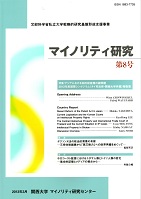Message from editor of the “International Relations and Minority” research team, (Professor Taira Nishi).
In the history of modern law, the legal treatment of minority, especially in the context of international relation, has been ranked as an important matter. For instance, when the Religious war, which had been taken place from the 16th to 17th century ceased, an important clause on treatment of religion minorities was raised up; or after the end of the first world war, in which the old empire states were dissolved, the problem of autonomy of ethnic minorities had become the major problem of international relationship since then. How the Treatment of minority has become the matter of concern in international discipline formation is not merely a coincidence. During the formation of modern Nation-State, the European order was reformed according to the territory principle. Therefore, the Nation-State tolerance for social power of territories in subject, which generally be expected to occur, was an essential factor required for international and domestic order. This reflects that the autonomy of minority has to be approved by law.
From the middle of the 19th century to 20th century, democratic political decision by people (the citizen) had become the national legitimacy basis. Consequently, majority or (minority) groups in the empire state had, so as to become the autonomous democratic decision maker, claimed for their rights to self-determination and rights to self-government, and partially materialized these. The rights of the minorities has, as well as the freedom from the nation-state or equality before the law, also the rights of minority to self-determination and self-government for supporting a person politically or a collectively has also been materialized together with the reformation of international order.
Since the latter half of the 20th century, the two branches of the minority rights may be observed as that they have gradually been turned into a relatively strained relationship, and coexistence. In order to understand and clarify the structure of complicate dispute about the “Minority”, we have to solve the problems from the point of view of the history, to which perspective from international relationship is essential. And that is the significance of our research group.



